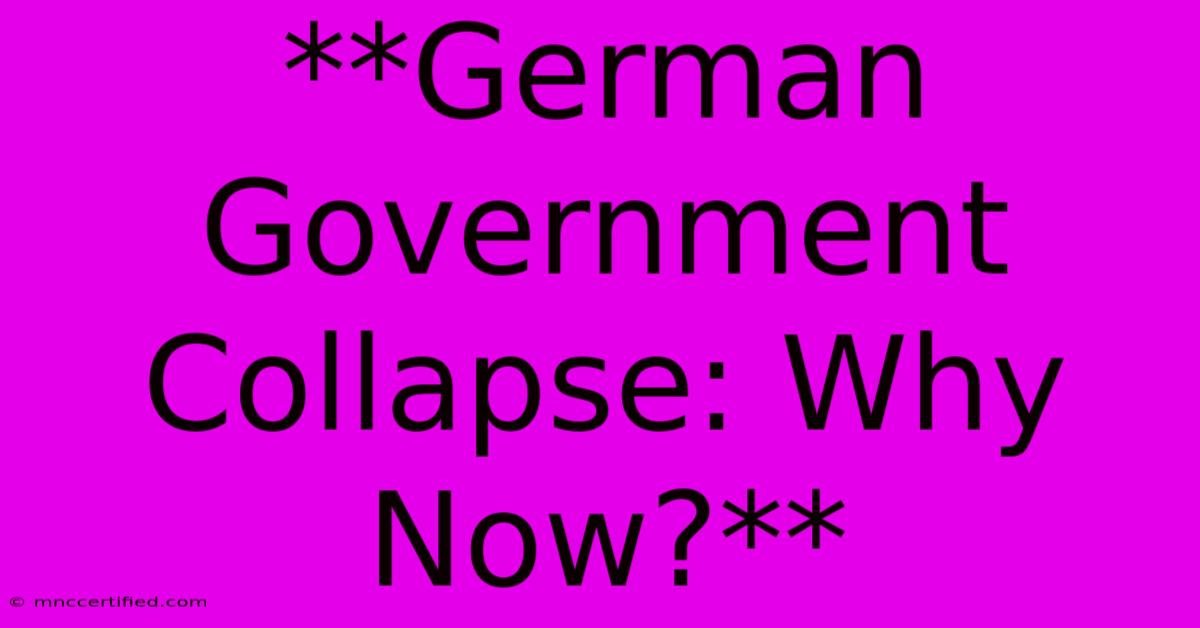**German Government Collapse: Why Now?**

Table of Contents
German Government Collapse: Why Now?
The recent collapse of the German government, a coalition of the Social Democratic Party (SPD), the Greens, and the Free Democratic Party (FDP), has sent shockwaves through the political landscape. While the immediate trigger was a disagreement over energy policy, the underlying causes are far more complex and reveal deep fractures within German society.
A Perfect Storm of Factors:
- Energy Crisis: The war in Ukraine has exposed Germany's vulnerability to Russian energy dependency. The coalition partners clashed over the speed and extent of phasing out fossil fuels, with the Greens advocating for a rapid transition to renewables and the FDP pushing for a more gradual approach. This conflict highlighted the different ideological priorities of the parties.
- Inflation and Cost of Living: Soaring inflation, coupled with rising energy prices, has placed enormous pressure on German households. The coalition's inability to provide swift and effective solutions fueled public discontent and increased political pressure.
- Immigration and Integration: Germany has faced increasing challenges in integrating immigrants, particularly those from Muslim-majority countries. The issue of integration has become a polarizing one, with right-wing parties capitalizing on public anxieties.
- Climate Change: While Germany has made progress in transitioning to a green economy, many citizens feel the government is not doing enough to tackle climate change. This frustration has contributed to a growing sense of unease and disillusionment.
- Internal Power Struggles: The coalition government was plagued by internal power struggles and a lack of clear leadership. This created a climate of instability and hampered the government's ability to make decisive decisions.
The Political Aftermath:
The collapse of the coalition government has thrown Germany into a state of political uncertainty. A new election is expected in the coming months, raising questions about the future direction of the country. The main contenders for power, the SPD, the Greens, and the Christian Democratic Union (CDU), are all grappling with the challenges of building a stable and effective government in the face of a polarized electorate.
Looking Ahead:
The German government collapse is a stark reminder of the complexities and challenges facing modern democracies. The issues that led to the collapse, from energy security to social inequality, are deeply interconnected and require nuanced solutions. As Germany prepares for new elections, it is imperative that political leaders engage in open and honest dialogue with citizens, address the concerns of all segments of society, and strive for a more united and resilient nation.
Beyond the Headlines:
- The role of social media: The role of social media in exacerbating political divisions and spreading misinformation should not be overlooked.
- The need for political reform: The collapse of the German government highlights the need for political reforms, including increased transparency, accountability, and citizen engagement.
- The impact on Europe: Germany's instability could have a ripple effect across Europe, particularly in terms of EU policy and international relations.
The collapse of the German government is a significant event with far-reaching consequences. It is a time for reflection, analysis, and a renewed commitment to democratic values and the pursuit of common good.

Thank you for visiting our website wich cover about **German Government Collapse: Why Now?** . We hope the information provided has been useful to you. Feel free to contact us if you have any questions or need further assistance. See you next time and dont miss to bookmark.
Featured Posts
-
British Virgin Islands Travel Insurance
Nov 08, 2024
-
Pattern Recognition Software For Trading
Nov 08, 2024
-
Outer Banks Showrunners Discuss Finale Bombshell
Nov 08, 2024
-
Spider Vein Treatment Insurance Coverage
Nov 08, 2024
-
Ashley Jensens Journey After Personal Loss
Nov 08, 2024